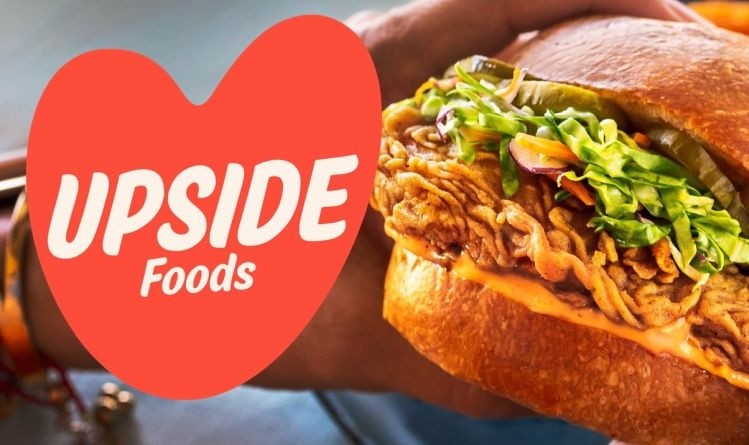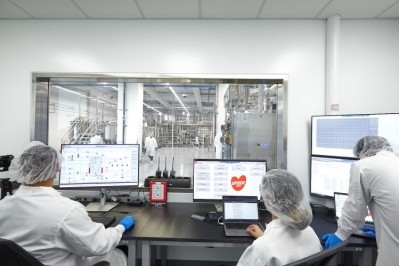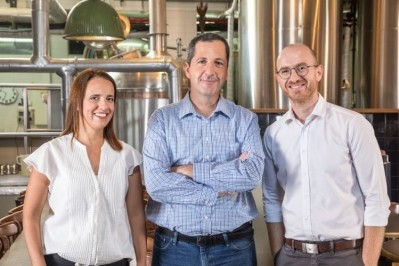Memphis Meats rebrands as UPSIDE Foods, gears up to launch cell-cultured chicken by year-end: ’This is a big historic step for the entire industry’

The Berkeley-based firm - which was founded in 2015 and has raised more than $181m to date from backers including Bill Gates, Tyson Foods and Cargill – also announced a new investor: Whole Foods CEO John Mackey, a high-profile supporter of cell-cultured meat, which promises to deliver the experience of ‘real’ meat without slaughtering animals.
The pilot plant in the East Bay area of San Francisco – which is being “custom-built for meat cultivation” will “produce, package and ship cultured meat at a larger scale than any other company in the industry, all under one roof,” says the company, which is billing its wares as “delicious, sustainable and humane meat for everyone.”
What will the first chicken products look like?
So what will the first products from UPSIDE Foods look like?
Communications director David Kay would not confirm if the initial products – which will likely launch in a “handful of restaurants” - will be made from 100% cell-cultured meat or will be hybrid products combining animal cells and plant-based meat (an approach deployed by Eat Just in Singapore), but said more information would be released on this shortly.
Asked whether UPSIDE Foods will be separately culturing fat and muscle cells and then combining them to make a processed chicken product, or if more complex structured ‘whole-cut’ type products involving the co-culturing of different cell-types, perhaps around edible scaffolding, is on the cards, Kay told FoodNavigator-USA:
"We have the ability to produce a cut of meat, which you can see in the chicken salad photo below, as well as ground or minced products."
He added: “Compared to the scale of conventional meat production and consumption today, obviously there's still a long way to go, but this is big historic step for the entire industry. We also want this facility to be accessible to the public, and to offer tours as we’re committed to transparency.”
It’s early days, he said, “But we see a lot of progress on reducing costs in growth media and other areas and while the first products will be priced at a premium, as we scale, the goal is to be competitive and ultimately to produce meat that is more affordable than conventionally produced meat.”
Commercial viability of cell-cultured meat production
Logically, growing meat from cells in bioreactors instead of living, breathing animals should be more efficient, as resources are spent on growing only the cells that make up the meat product rather than maintaining the day-to-day activities of an entire animal’s body.
The approach also offers several advantages over traditional meat in that it does not contain bacterial pathogens that pose food safety risks and may have a longer shelf life; it will not suffer from price/supply volatility risks from animal infectious diseases (avian flu, porcine epidemic diarrheal virus); requires fewer inputs for a given quantity of meat, and is more controllable and tunable, enabling production of only high-grade meats in quantities dictated by consumer demand, rather than by the biology of the animal.
And while there are many known unknowns (and likely some unknown unknowns too) when it comes to producing cell-cultured meat on an industrial scale, costs are coming down, said Kay.
Is cell-cultured meat better for you?
But what about health?
Is reproducing (albeit more ethically and sustainably) a product that many commentators argue is basically not good for us really a better idea than encouraging consumers to reduce meat consumption or switch to plant-based alternatives?
There is room in the market for multiple approaches, including plant-based meats, argued Kay. “Some consumers will eat plant-based meat, but there is always going to be a part of humanity [that wants animal meat] as it’s such a key part of our social traditions and cultural heritage.”
As for health, he claimed, cell-cultured meat does not carry the same risks of bacterial contamination, while its nutritional profile can be customized: “One of the things we're exploring is could we make a steak with a fat profile of salmon for instance?"
Antibiotic-free?
And while antibiotics may be used in laboratory settings given the number of researchers handling cells, UPSIDE Foods is confident that commercial-scale production of cultured meat will be possible without antibiotics, a real plus given consumers’ concerns about the use of antibiotics in the conventional meat industry and its contribution to antibiotic resistance, he said.
Regulatory: Impressed with engagement from FDA, USDA
On the regulatory front, Memphis Meats started conversations very early with the relevant officials at the USDA and FDA, who announced a joint regulatory framework for cell-cultured meat in early 2019 and have since set up working groups on pre-market assessment; labeling and claims; and the transfer of inspection authority.
“Both the agencies have been moving quickly and we're committed to continuing to give them the information they need to inform their process," said Kay. "Our hope is that we will be able to sell a product by the end of this year.”
Genetic engineering: 'We're open to it’
Asked about the use of genetic engineering techniques to immortalize cells or increase the number of times that cells will divide before they peter out and you have to go back to your source (ie. animals), Kay said:
"We expect the cells will be able to self-renew indefinitely. We're exploring multiple methods and when it comes to cell lines we're open to genetic engineering or any tool that could enable us to increase our positive impact on the planet."
Labeling: What do we call meat grown from animal cells (outside of animals)?
While the USDA and the FDA have outlined a regulatory framework for foods containing cultured meat and seafood cells (which has yet to be finalized), they have not yet nailed down the nomenclature, which is challenging, as it has to both convey what the products are, and differentiate them from existing products, without disparaging them.
According to a super-majority of the Alliance for Meat, Poultry and Seafood Innovation (of which UPSIDE Foods is a member) and The National Fisheries Institute in a comment submitted to the FDA in March, 'cell-cultured' probably works best for both seafood and meat/poultry.
In a separate submission filed with the FDA, UPSIDE Foods (then Memphis Meats) said it was critical to ensure “that consumers understand that they are purchasing a real meat, poultry or seafood product and not another product like a plant-based alternative.
“It would simply be misleading for labeling to indicate that cell-cultured products are made primarily from plants.”
UPSIDE Foods’ own consumer research, conducted in partnership with marketing firm NorthStar, further indicated that "use of 'cell-cultured' also conveyed differentiation with plant-based proteins," said the company.
According to a recent analysis by Dutch consultancy CE Delft, cell-cultured meat could be cost competitive with some forms of conventional meat within a decade, although the authors acknowledge that data gaps exist and assumptions will change as the industry matures.
"Consumers are hungry for products that are humane, sustainable and delicious, and UPSIDE Foods is meeting them at the center of their plates with meat they can feel good about. This has the potential to revolutionize the way people eat and is incredibly exciting. The world 20 years from now may be completely different due to UPSIDE Foods, which is why I've personally invested in the company.”
John Mackey, CEO, Whole Foods
"Our team introduced the world to cultured meat, and the evolution to UPSIDE Foods communicates our passion and potential to make our favorite foods healthier for the planet. Our new name showcases the work we are doing to make eating meat a force for good. We can't wait for consumers to try our UPSIDE chicken soon.
"If you love chicken and the planet, UPSIDE is for you."
Uma Valeti, CEO and founder, UPSIDE Foods




















